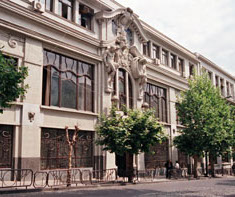
TBILISI, DFWatch–For the second time this year, the National Bank has increased the refinancing rate by half a percentage point. The rate now stands at 5 percent.
About 8,000 people will have higher interest rate on their loans because of the change. Economic analysts see a greater problem: that the development of the economy will be made more difficult.
The National Bank explained that the decision comes as a result of the drop in the value of the national currency and said that by the end of year the refinancing rate may increase to at least 5.5 percent.
“Due to the lari’s depreciation, the inflation expectations have risen, which can be reflected in the risks of the inflation deviating from its target level in the medium term,” the bank’s statement reads.
“The deterioration in economic trends in our main trade partners continues to negatively affect the Georgian economy.”
The national currency continues to drop. Devaluation started in November, 2014. In January the rate had been retained for a while, but in recent months the lari has continued to drop and is now at its lowest level for years. One USD is about 2.33 laris, while in November it was 1.75 laris. One dollar used be around 1.65 laris.
The government doesn’t see the lari devaluation is a problem, claiming that it is ‘natural’ and there is nothing ‘alarming’, but opponents criticize the government.
Increasing the refinancing rate by the National Bank hasn’t been unexpected for economic analysts. They say considering the current situation, this is one way to avoid an increase in prices. However, they also think that increasing the refinancing rate will have a negative impact on banks and the business environment.
“Increasing the refinancing rate is one of the means for stabilizing the lari, but at the expense of cutting business activity. This is a forced step and of course, this will reduce the credit activity of the banks, because the percent is being reduced. This means increase of loans for business and cutting curtailment of activity in order to achieve the stability of the lari,” Roman Gotsiridze from Economic Development Center told DF Watch.
Giga Bedineishvili, a dean of the business school at the Free Univerisity, explains that the motivation for the National Bank in this case is to increase the interest rate, which is considered one of the methods to slow down the increase in prices.
“However, increasing the interest rate causes further loss of flexibility in the economy and a slowdown in business.”
The analysts think what the National Bank has done reflects the current situation. It means that the monetary crisis is deepening, and this will have a negative influence on the economy, and eventually impact ordinary people.
When it comes to individuals, 7,494 people will have higher interest rate on their loans because of the increased refinancing rate, according to the non-governmental organization Society and Banks, which based its estimate on information from banks.
By April 30, 5,147 people had mortgage loans linked to the refinancing rate, while 2,347 legal entities have business loans. The number of people whose loans increased because of increasing refinancing rate has grown by 481 since January.

